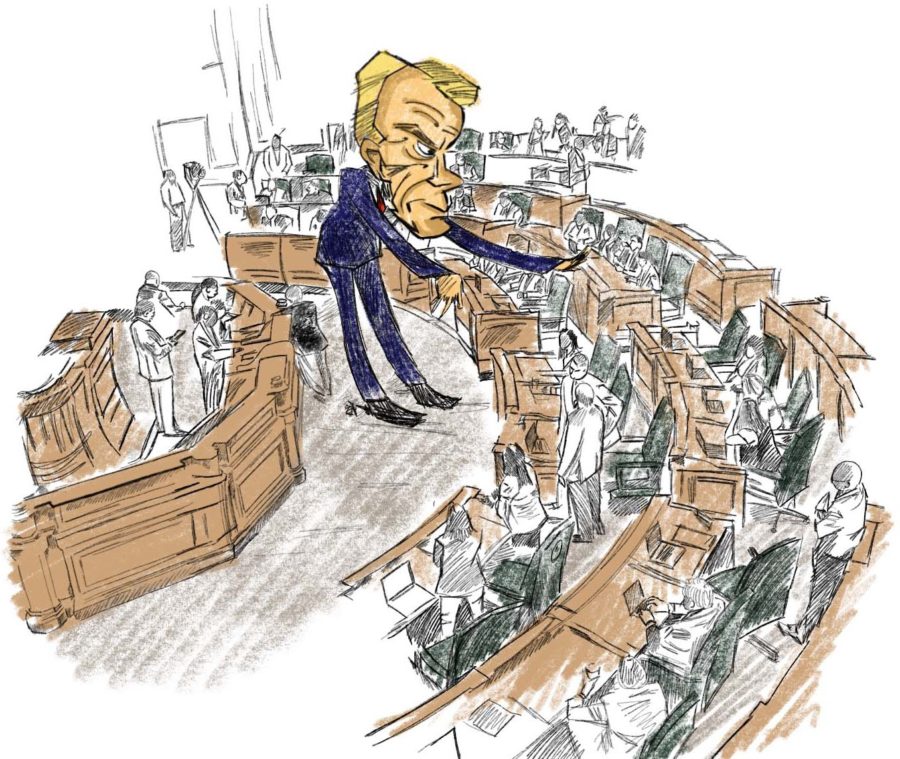A man by many names: Speaker Michael J. Madigan
The Little Dictator, the Velvet Hammer, king. Whatever the designation, Michael J. Madigan, speaker of the house in the Illinois General Assembly is known to be one of the most powerful Chicagoans working in the state of Illinois
The man who would become Illinois’ longest served Speaker of the House grew up in the Clearing neighborhood on the south side of Chicago where he said he’d like to think he lived like a normal American child. What was abnormal was the involvement in politics. Madigan’s father worked as a Democratic precinct captain for the thirteenth ward and was somewhat close to powerhouse Mayor Richard J. Daley.
Politics were discussed daily in his childhood home where he was influenced by his father’s “New-Deal Democrat” politics and taught to be a loyal Democrat.
Naturally, Madigan followed his father’s footsteps and got involved in democratic politics, starting locally in Chicago, attending the 1970 constitutional convention as a delegate and eventually his election to the Illinois House of representatives.
As a political operator, Madigan is somewhat unlike what were the stereotypes of yesteryear’s legislators; he shuns red meat and alcohol. He is considered somewhat of a prude and lives very privately. He isn’t an avid golfer but a silent workhorse known for reading every bill and resolution that will pass through the house. Philosophically, Madigan is more of a conservative Democrat with strong ties to unions.
A rare glimpse into the speaker’s philosophy, as well as some of his family history came from an interview in the 80’s with Chicago Magazine journalist Bruce DuMont, right around when Madigan’s true power in Illinois began.
He told the reporter that he was brought up with the idea that the Democratic party could only win if it was “the party of prosperity.” The democrats of today focused on too many special issues instead of being a party of economic success which people could get behind, which was in in his mind why the Democrats become the minority.
The idea of power and the projection of power is also key to the speaker’s philosophy. He once admitted to a reporter that he had helped constituents in a legislator’s district purely to foster a relationship. Some of this patronage and projection of power has caused ire as well.
In 2013 after a head of the Metra commuter train agency resigned after feeling goaded into bending to Madigan’s wishes.
It was revealed he had called up governments or various agencies with openings and recommend individuals loyal to him for the position. While technically not demanding these appointments, many of those who were called by the speaker said they felt compelled to follow his orders due to his power to affect the budget. These patrons then would contribute to Madigan’s campaigns or the funds used to keep the party in power.
All of this maneuvering and political power has earned him his various nicknames over the years.
His long tenure, almost 34 years now, has earned him enemies however, among them the think-tank and advocacy group Illinois Policy Institute and the current sitting governor of the state, Bruce Rauner.
Rauner has a very specific fiscally conservative policy agenda which clashes with Madigan’s pro-union and power agenda.
For three years the two ran their factions in the assembly vigorously struggling over how to pass a budget for the state. At some points, the two did not even allow talks to proceed to beat the impasse. Eventually, compromise was reached but there is still tension between the two powerhouses.
Rauner’s allies have stepped up their attacks of Madigan for the looming campaign cycle, calling him “King Madigan” among other titles. But opposition hasn’t deterred Madigan and with the term of Gov. Rauner, he has shown how far he is willing to go.
Illinois can only hold it’s breath what the two powerhouses of state government will do in 2018.










